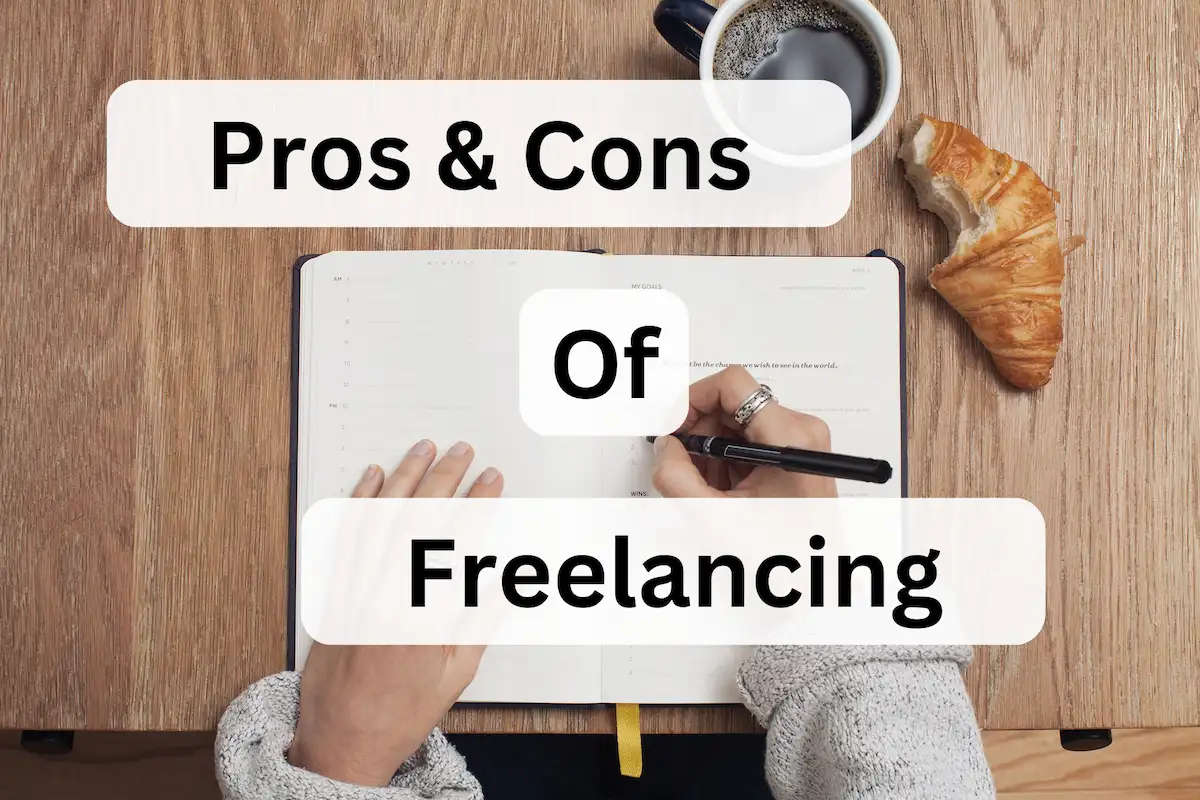Freelancing is a popular career choice for many and has the potential to provide a flexible lifestyle. However, it’s important to understand both the pros and cons of freelancing before diving in headfirst. In this article, I will explore some of the major benefits and drawbacks associated with this type of work.
The Pros Of Freelancing
Freedom To Choose
As a freelancer, you have the freedom to choose your clients and projects. This allows you to pursue work that aligns with your interests and skills, leading to greater job satisfaction than many careers might offer.
You also have the flexibility to set your own schedule and work from anywhere, which can make it easier to balance work and personal life. Not being tied to a physical location also means you can travel more freely and experience different cultures, which can further enhance your creativity and productivity.
Higher Earning Potential
Another significant advantage of freelancing is the potential to earn more money. As a freelancer, you can set your own rates and negotiate your pay with clients. With the right skills and experience, you can command higher rates and even charge premium prices for specialized services.
This can be particularly lucrative if you work in industries such as technology or creative design, where demand for such services is high. Obviously traditional employment can lead to high salaries, but you have less control over your earnings than with freelancing (at least once you start getting consistent work and can offer a high standard of service).
Income Diversification
Freelancing also allows you to diversify your income streams, which can provide greater financial stability. Instead of relying on a single employer or source of income, you can take on multiple projects or clients and spread out your earnings.
This can help ensure that you have a steady income stream, especially during periods where work may be scarce in one particular field. However, there is of course more of a risk of work drying up, which can leave you with no income at all.
Learning New Skills
Being a freelancer also affords you the opportunity to work in various industries and learn new skills. With each project or client, you gain new experience and knowledge that you can apply to future work.
This can help broaden your portfolio and make you more competitive in the job market. Working with multiple clients and projects can lead to networking opportunities and potential referrals, which can lead to more income later down the line.
More Control
Freelance work can also provide greater autonomy and control over your work. Without the structure and bureaucracy of a traditional office environment, you can tailor your work environment to best suit your needs.
This can include working during your most productive hours, taking breaks when necessary, and pursuing projects that fit your personal values and interests. As a result, many freelancers report feeling a greater sense of control and ownership over their work.
Take On New Challenges
Being a freelancer affords you the chance to take on challenging projects that align with your interests and passions. With such projects, you can stretch your creative muscles and engage in activities that bring you fulfilment.
You can also take more risks and try out new things, whether it be a new skill, new client, or a new project altogether. This constant evolution and improvement can help you build a strong personal brand and stay ahead of the curve in your field. However, the key word there is risk!
Greater Flexibility
Finally, freelancing can allow you to enjoy a better work-life balance than many traditional jobs. You can choose to work fewer hours or more hours depending on your schedule or energy levels.
This flexibility can help you avoid burnout and take care of your mental health. Plus, since you are not bound to a traditional office environment, you can avoid long commutes and spend more time with your family and friends. These benefits can significantly enhance your quality of life, making freelancing a compelling career choice.
But what are the downsides of freelancing?
The Cons Of Freelancing
Lack Of Job Security
One major disadvantage of freelancing is the lack of job security. Unlike traditional employment, freelancers do not have a guaranteed income or benefits package. This means that freelancers must constantly search for new clients and projects to keep their income flowing.
Freelancers must always be prepared for periods of low demand, where little or no work may be available, which can result in financial instability. This isn’t an issue for many people in traditional employment.
You Need To Be Self-Motivated
Another drawback of freelancing is the need for self-discipline and motivation. Since freelancers often work from home or other remote locations, they must rely on themselves to stay on task and meet deadlines.
This can be particularly challenging for those who struggle with time management or procrastination. The absence of a structured routine or office environment can be isolating, leading to a lack of social interaction and potential feelings of loneliness. Of course, if you are a very driven person, this can make freelancing more attractive!
You Need To Run It Like A Business
Another downside of freelancing is the burden of managing every aspect of your business. Freelancers must not only focus on their craft but also handle administrative tasks such as marketing, accounting, and billing clients.
This can take a considerable amount of time and effort away from the actual creative work that freelancers specialize in. The lack of employee benefits such as health insurance or retirement savings plans can also be daunting, as many freelancers must navigate complex tax regulations and financial planning on their own.
Constant Learning
Another con of freelancing is the need to constantly update your skills and knowledge, and all at your own expense. In many industries, the technology and best practices can change rapidly, and freelancers must stay on top of such changes to remain competitive.
This requires ongoing education, training, and certifications. Freelancers must protect against obsolescence and diversify their skill sets to stay ahead in the market. This often requires significant investment, both in terms of time and money, whereas employers might fund an employee’s training and development.
You’re On Your Own
When working in an office environment, connections are often literally at arm’s reach, with professional networks that freelancers may not have access to. Not having coworkers also means freelancers don’t have access to company-sponsored training or development events, team-building exercises, or other group activities that provide value both professionally and personally.
However, like the self-motivation requirement, this can make freelancing more attractive for some people. While I can work well in a team, I also enjoy going solo, which made freelancing a very attractive choice for me.
No Guaranteed Payment
Another downside to freelancing lies in the fact that clients are never guaranteed to pay in full or on time. Unlike a traditional work environment where payment is typically regular, freelancers are at the mercy of their clients’ payment schedules.
This can be particularly challenging when dealing with international clients, who may be subject to different banking regulations and payment processing timelines. Plus, since freelancers don’t have the backing of a larger organization, you need to deal with these issues on your own, which can be challenging and very stressful.
This can make freelance marketplaces a good choice for beginners, as they usually handle payments and disputes for you.
It Can Be Exhausting
Finally, freelancing can be mentally draining and emotionally exhausting. Unlike traditional employment where you can leave work at the office, freelancers may have trouble disconnecting from work if their office is at home, finding it difficult to separate their work and personal life.
It can be tough to balance self-care, your social life, and family life with freelance work. Working excessive hours, dealing with difficult clients, or juggling multiple projects may result in burnout and physical problems that interfere with their personal life. Of course, this is true of many traditional jobs as well.
How To Know If Freelancing Is Right For You
Freelancing is a great way to take control of your career and make the most of your skills and talents, but it’s not the right fit for everyone. Before making the leap into freelancing, consider whether you have what it takes to be successful.
Are You Motivated?
First and foremost, you need to be highly organized and motivated. Freelancers must be able to manage their own time, set and meet deadlines, and juggle multiple projects efficiently. You should also have good communication skills so you can build solid relationships with clients.
Do You Have Business Savvy?
Freelancers need a certain level of business acumen to stay on top of accounting and taxes, market their services in the most effective way, and price their services competitively.
Can You Take Your Development Into Your Own Hands?
Finally, freelancers must be willing to invest in their professional development so that they can remain competitive in the market. This means taking classes or courses to upgrade your skills, attending conferences or networking events, and staying up to date on trends in the industry.
Questions To Ask Yourself
Questions to ask yourself to determine if freelancing is right for you include:
- Do I have the discipline and motivation to manage my own time?
- Am I familiar with tax regulations and financial planning as they relate to my industry?
- Am I prepared to invest in my professional development?
- Will I be able to handle the uncertainty of not having a steady income?
- Can I stay focused on my work while working from home or other remote locations?
- Am I willing to put in extra effort when needed, such as taking on additional projects or deadlines that may come up unexpectedly?
Final Thoughts
If you think you have what it takes to be a successful freelancer, then take the plunge! With determination and hard work, you can make a living doing something that you love, and increase your income potential along the way. But before you jump in, there are some freelancing myths to be aware of.
Chris is the creator of Freelance Ready. He originally started freelancing (on Fiverr) while at university, writing and editing website content. He created this website to share his freelancing experience and help others on their own self-employed journeys. He is now a freelance SEO consultant and content editor. You can learn more about Chris here.
Freelance Ready is reader-supported. That means some links on this website are affiliate links. If you sign up or make a purchase through these links, we may earn a commission.


